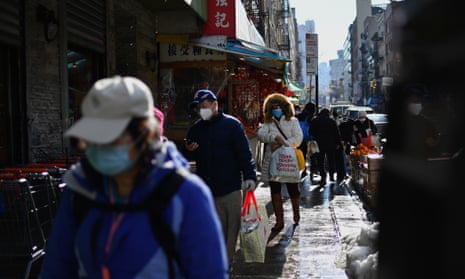As an increase in anti-Asian bigotry continues to sweep across America, politicians and community advocates have called for action to combat a disturbing surge in physical attacks and harassment.
During a press conference last week, top congressional Democrats condemned the increase and said much of the blame lies in former president Donald Trump’s racist rhetoric about Chinese people and the coronavirus.
The Asian American community has reached a “crisis-point”, said Judy Chu, a California congresswoman who chairs the Congressional Asian Pacific American Caucus. Community members were “terrified by the alarming surge in anti-Asian American bigotry,” she said.
“These attacks are no accident,” Chu said. “It’s clear January 6 was not the only violence Donald Trump incited.”
Chu’s words come amid a wave of violent incidents against Asian American and Pacific Islanders across the US. Although it is difficult to prove that these violent incidents are purely motivated by bigotry, activists and community leaders, as well as victims and their families, think that race has played a major role.

Vicha Ratanapakdee, an 84-year-old Thailand native who lived in San Francisco, died several weeks ago after being shoved to the ground. The victim’s family reportedly said to KTVU that he was attacked because of his race and age.
“What else could have motivated him?” Ratanapakdee’s son-in-law said of the attacker.
Across the bay, a man shoved three people in Oakland’s Chinatown neighborhood. The victims – a 91-year-old man, a 60-year-old man, and a 55-year-old woman – were injured, according to CNN.
In the Flushing neighborhood of New York City, a 52-year-old Chinese-American woman was attacked outside a bakery on Tuesday. This woman asked a man in front of her about the line, and he then became “extremely angry, yelled and cursed at her, used his hand to touch her face and came face-to-face-with her”, prosecutors said in court papers.
The victim’s daughter said on Facebook that he shoved her “with such force that she hit her head on the concrete and passed out on the floor”, according to NBC New York.
The same day, two Asian seniors were assaulted on the subway in separate incidents, the network said.
The man accused of involvement in the bakery incident was charged with third-degree assault and second-degree harassment. He was not charged with a hate crime, records indicate.
Former president Bill Clinton also spoke out against increasing reports of anti-Asian attacks. “I’m deeply concerned about the rise in hate crimes targeting Asian Americans,” he said on Twitter. “We must speak out against discrimination of all kinds, reject the ignorant rhetoric driving this wave of violence, and reach out to support our neighbors.”
Stop AAPI Hate, a national coalition documenting anti-Asian bigotry during the pandemic, said the organization had received more than 2,808 “firsthand accounts of anti-Asian hate” from 19 March to 31 December. These reports are from 47 states and the District of Columbia.
According to Stop AAPI Hate’s data, physical assaults comprised 8.7% of these incidents, while coughing/spitting totaled 6.4%. Verbal harassment constituted 70.9% of these incidents; and shunning or avoidance were 21.4%.
Figures from law enforcement agencies are similarly disturbing. The New York police department’s records also show a troubling increase in anti-Asian hate crimes. In 2020, there were reports of 29 total victims – with 24 listed as having “coronavirus motivation”. In 2019, there were just reports of three anti-Asian hate crimes recorded by the department.
From 1 January to 17 February, the most recent NYPD data provided, authorities reported that there were two victims of anti-Asian hate crimes. In this same period of 2020, there were no reported victims of anti-Asian crimes.

“No area really is immune. It’s urban, rural,” said Manjusha Kulkarni, executive director of the Asian Pacific Policy and Planning Council, to the Guardian. “Even when the country was largely sheltering in place, people were experiencing incidents at grocery stores, at pharmacies, at big-box retailers.”
“Those were the only places we were able to go … they had to worry that somebody might verbally attack them or physically assault them or refuse them service as they were just trying to sort of eke out an existence,” said Kulkarni.
“It has our seniors and the women more concerned. It seems like they’re picking on seniors,” said Karlin Chan, a community advocate in Manhattan’s Chinatown. “These people are opportunists. They’re not going to pick on a fit young man. It does have the community worried.”
Chan said that the community in Manhattan’s Chinatown was lucky to have experienced fewer incidents than Flushing had. However, residents were rattled by several incidents last winter, before the pandemic hit New York City.
“Right before lockdown, Chinatown was very quiet,” Chan said. “These opportunists, or some racists, would harass people. On the Lower East Side, streets were very quiet.”
In response, Chan formed a block watch that walks around the neighborhood several times a week, “just to assure neighbors and residents that there are people from the community, and outside the community, who are concerned”.
Chu and other lawmakers attending the press conference, including the House speaker, Nancy Pelosi, urged Congress to pass legislation that would provide federal grants to state and city governments to improve reporting of bias crimes and provide better support for victims.
Congresswoman Barbara Lee said everyone must work to “put a stop to hate and violence”.
“These tragic attacks are happening in communities across the country,” Lee said. “These attacks are just simply unacceptable.”
